广东版开心英语六年级上册 Unit 7 重要句型
新教科版(广州)英语六年级上册全册知识点归纳
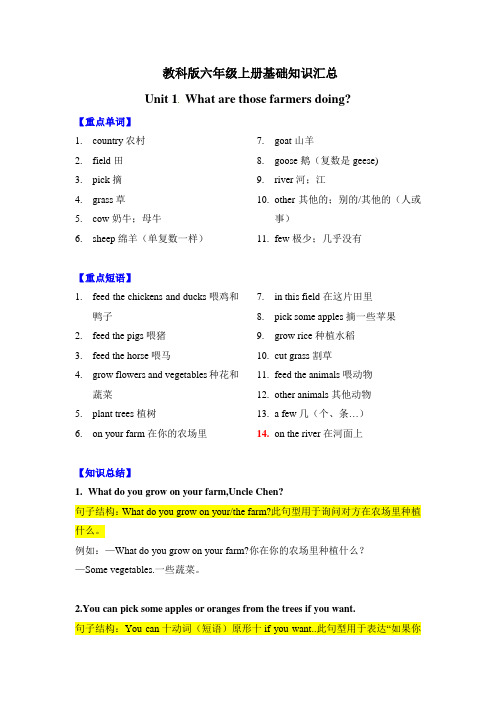
教科版六年级上册基础知识汇总Unit 1 What are those farmers doing? 【重点单词】1.country农村2.field田3.pick摘4.grass草5.cow奶牛;母牛6.sheep绵羊(单复数一样)7.goat山羊8.goose鹅(复数是geese)9.river河;江10.other其他的;别的/其他的(人或事)11.few极少;几乎没有【重点短语】1.feed the chickens and ducks喂鸡和鸭子2.feed the pigs喂猪3.feed the horse喂马4.grow flowers and vegetables种花和蔬菜5.plant trees植树6.on your farm在你的农场里7.in this field在这片田里8.pick some apples摘一些苹果9.grow rice种植水稻10.cut grass割草11.feed the animals喂动物12.other animals其他动物13.a few几(个、条…)14.on the river在河面上【知识总结】1.What do you grow on your farm,Uncle Chen?句子结构:What do you grow on your/the farm?此句型用于询问对方在农场里种植什么。
例如:—What do you grow on your farm?你在你的农场里种植什么?—Some vegetables.一些蔬菜。
2.You can pick some apples or oranges from the trees if you want.句子结构:You can十动词(短语)原形十if you want..此句型用于表达“如果你想要的话,你可以…”。
if是连词,在这里用于引导条件状语从句,意为“如果”。
can是情态动词,与动词原形搭配使用。
新广州版小学英语六年级上册短语、句型汇总(默写版和答案版)

新广州版小学英语六年级上册短语、句型汇总(默写版和答案版)Unit 1 What are those farmers doing?短语____________________________在农场里____________________________在田里____________________________一些鹅____________________________喂鸡____________________________种花句子1.---______________________________________________________ __XXX,你在农场里种些什么?__________________________________________________ ______我经常种些花。
2.---______________________________________________________ __那些农民正在做什么?__________________________________________________ ______.他们正在割草喂植物。
3.---______________________________________________________ __Yes。
I do.在农场里你还有其他的动物吗?--是的,我有。
Unit 2 A country life is a XXX.短语____________________________在一个小农场____________________________挤牛奶____________________________回到家____________________________觉得疲倦句子1.---______________________________________________________ __.我喜欢住在农村里,但我经常很忙。
开心学英语六年级上册Unit7He’sbetterthanus课件
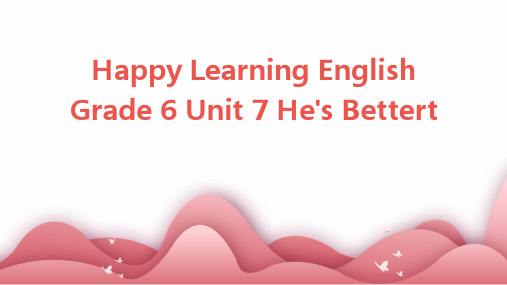
Communication skills
To develop students' ability to communicate effectively in English through speaking, listening, reading, and writing activities.
Cultural understanding
The comparative level is often used in everyday conversation and writing to express opinions and comparisons.
It is formed by adding the suffix "-er" to the comparative form of adjectives and by using the comparative form of the adjective with the same meaning as the adjective in the second part of the sentence.
To provide speaking and listening activities that focus on fluency and comprehension, including role-plays, debates, and group discussions.
To develop students' writing skills through assignments that require them to write essays, letters, and other types of compositions.
义务教育教科书英语(广州版)六年级上册
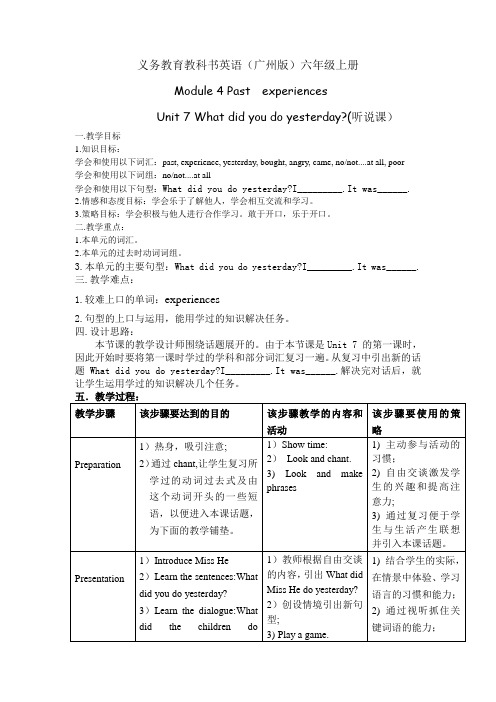
义务教育教科书英语(广州版)六年级上册Module 4 Past experiencesUnit 7 What did you do yesterday?(听说课)一.教学目标1.知识目标:学会和使用以下词汇:past, experience, yesterday, bought, angry, came, no/not....at all, poor学会和使用以下词组:no/not....at all学会和使用以下句型:What did you do yesterday?I_________.It was______.2.情感和态度目标:学会乐于了解他人,学会相互交流和学习。
3.策略目标:学会积极与他人进行合作学习。
敢于开口,乐于开口。
二.教学重点:1.本单元的词汇。
2.本单元的过去时动词词组。
3.本单元的主要句型:What did you do yesterday?I_________.It was______.三.教学难点:1.较难上口的单词:experiences2.句型的上口与运用,能用学过的知识解决任务。
四.设计思路:本节课的教学设计师围绕话题展开的。
由于本节课是Unit 7 的第一课时,因此开始时要将第一课时学过的学科和部分词汇复习一遍。
从复习中引出新的话题What did you do yesterday?I_________.It was______.解决完对话后,就让学生运用学过的知识解决几个任务。
反思这是一节对话教学研讨课。
本节课是U7的第一课时,也是六年级学生正式学习一般过去时。
因此,我把这节课的教学目标定位为学生会读动词的过去式,会运用一般过去时进行简单的对话。
本节课我的主线是我昨天做了什么,孩子昨天做了什么,我的朋友昨天做了什么,你昨天做了什么。
一开始,我设计了悬念,让学生猜我昨天去了哪里,做了什么。
学生们的兴趣盎然,纷纷举手猜,从而,我引出了要学习的内容。
学习完新的知识点后,我就让学生围绕“你昨天做了什么”来和同学进行对话。
广东版开心学英语六年级(上册)期末复习_每课重点单词短语_句子

Unit 1 Feeling Sick 重点单词&短语have a headache 头痛have a toothache 牙痛have a cold 感冒have a fever 发烧have a stomachache 肚子痛take some medicine 服药see the dentist 去看牙医stay in bed 躺在床上them 他们easy 容易的重点句型What’s wrong with you? 你怎么啦?I have a headache 头痛have a toothache 牙痛have a cold 感冒have a fever 发烧have a stomachache 肚子痛What’s wrong with him/her/Tony?He/She/Tony has …Please stay in bed.Please take some meidicine.You should take some medicine. You should see the dentist.Please +动词原形should+动词原形课文What’s wrong with you? 你怎么啦?I hurt my foot. 我的脚受伤了。
Let me have a look. 让我看一看。
Be careful next time. 下次小心。
I have a stomachache. 我肚子痛。
Please take some medicine. 请服药。
What’s the matter? 怎么了?I have a cold. 我感冒。
Please stay in bed. 请躺在床上。
What are they doing?他们正在做什么?They’re digging a well. 他们正在挖一口井。
Digging a well? 挖一口井?I can help them. 我可以帮助他们。
广东版开心学英语六年级上册期末复习,每课重点单词短语,句子(2021年整理)
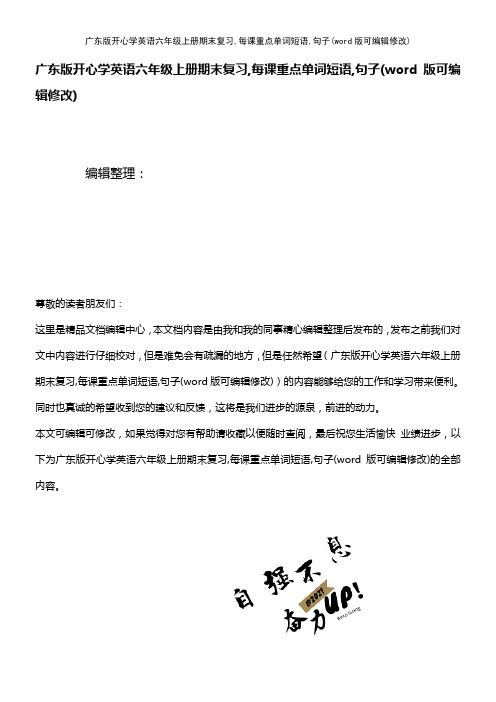
广东版开心学英语六年级上册期末复习,每课重点单词短语,句子(word版可编辑修改)编辑整理:尊敬的读者朋友们:这里是精品文档编辑中心,本文档内容是由我和我的同事精心编辑整理后发布的,发布之前我们对文中内容进行仔细校对,但是难免会有疏漏的地方,但是任然希望(广东版开心学英语六年级上册期末复习,每课重点单词短语,句子(word版可编辑修改))的内容能够给您的工作和学习带来便利。
同时也真诚的希望收到您的建议和反馈,这将是我们进步的源泉,前进的动力。
本文可编辑可修改,如果觉得对您有帮助请收藏以便随时查阅,最后祝您生活愉快业绩进步,以下为广东版开心学英语六年级上册期末复习,每课重点单词短语,句子(word版可编辑修改)的全部内容。
Unit 1 Feeling Sick 重点单词&短语have a headache 头痛have a toothache 牙痛have a cold 感冒have a fever 发烧have a stomachache 肚子痛take some medicine 服药see the dentist 去看牙医stay in bed 躺在床上them 他们easy 容易的重点句型What’s wrong with you?你怎么啦?I have a headache 头痛have a toothache 牙痛have a cold 感冒have a fever 发烧have a stomachache 肚子痛What’s wrong with him/her/Tony?He/She/Tony has …Please stay in bed.Please take some meidicine.You should take some medicine。
You should see the dentist.Please +动词原形should+动词原形课文What’s wrong with you?你怎么啦?I hurt my foot。
2016六年级英语上册第七单元重点短语、句型(译林版)
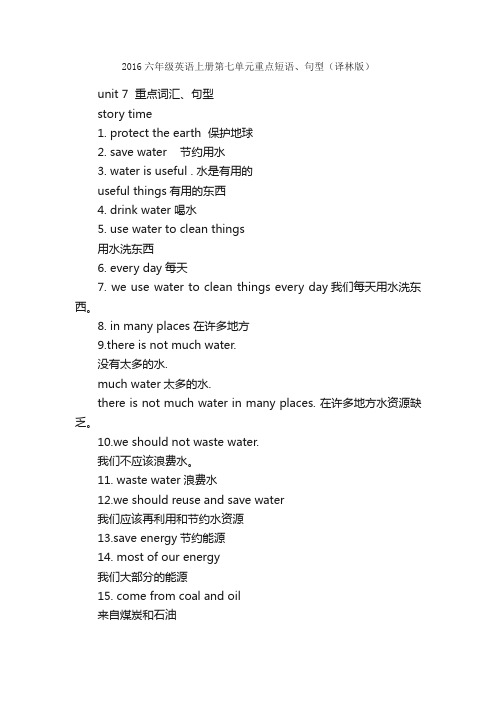
2016六年级英语上册第七单元重点短语、句型(译林版)unit 7 重点词汇、句型story time1. protect the earth 保护地球2. save water 节约用水3. water is useful . 水是有用的useful things有用的东西4. drink water 喝水5. use water to clean things用水洗东西6. every day每天7. we use water to clean things every day我们每天用水洗东西。
8. in many places 在许多地方9.there is not much water.没有太多的水.much water太多的水.there is not much water in many places. 在许多地方水资源缺乏。
10.we should not waste water.我们不应该浪费水。
11. waste water浪费水12.we should reuse and save water我们应该再利用和节约水资源13.save energy节约能源14. most of our energy我们大部分的能源15. come from coal and oil来自煤炭和石油16.there is not much coal or oil on earth.地球上没有太多的煤炭和石油on earth在地球上17. we should save energy.我们应该节约能源。
18. we should not drive so much.我们不应该多开车。
drive so much 多开车19. use a lot of energy使用许多能源20. save trees 节约用树21. we should save trees.我们应该节约用树。
22. wood comes from trees木头来自于树木come from = be from来自...23.we use wood to make tables, chairs and many other things.我们用木头制作桌子,椅子和许多其它东西。
广州版小学六年级英语上册每单元要点

That's a good idea!
那是个好主意.
Module3An Invitation
Unit7Ben Wants to Play Football
一、单词双基
★away
离开
★come to tea
来喝茶
★bored
厌烦的
★go away
走开
★go boating
去划船
★go swimming
telephone
忙的
二、短语双基
1.
at home
在家
2。
at lunch time
午餐时间
3.
at school
在学校
4。
beafraidof
害怕……
5.
be free
有空
6。
call sb.
给……打电话
7.
Yes,I'd love to, thanks a lot.
非常愿意,谢谢。
2。
Why don't you come tomyhouse at twenty past eight?
你为什么不在8:20到我家来呢?
Great!
太好了!
That’s a good idea。
那是个好主意。
3。
What film are you going to see?
抱歉,我正忙呢。迟些时候吧.
OK./ All right. / Sure.
可以./好吧./当然。
2。
Would you like to come to my party?
你能来我的聚会吗?
Yes, I’d love to。
六年级上册英语Module 7 Let

六年级上册英语Module 7 Let's look back重点词汇总结六年级上册英语module7Let'slookback重点词汇总结Unit1whatAreweGoingtoDoforourHoliday?一、单词双基★alotof许多......★lot许多★clothes衣服★havefun玩得开心★havebeento到过★instead代替★plan计划cruise漫游;游弋dimsum点心pearl珍珠thePearlRiver珠江temple庙theSixBanyanTemple六榕寺yummy味道好的;好吃的二、短语双基.allofus我们大家2.buynewclothes买新衣服3.climbtheBaiyunHill爬白云山4.dosomereading读书5.eatdimsumatGuangdongrestaurant在广东酒家吃点心6.goodidea好主意7.goonthePearlRivercruise游珠江8.goshoppinginXiajiuRoad在下九路购物9.GuangzhouArtmuseum广州艺术博物馆0.havebeento到过1.havealotoffun玩得很开心2.havefun玩得开心3.havelunch吃午饭4.manytimes多次5.playcards打牌6.schoolholiday学校假期7.seewhitetiger看白老虎8.surftheNet上网9.takephotos照相20.thePearlRiver珠江21.theSixBanyanTemple六榕寺22.XiangjiangZoo香江野生动物园23.wanttodosth.想要做某事24.watchbirds观鸟25.writealetter写信三、句型双基.whatareyougoingtodo?你打算干什么?IamgoingtoclimbBaiyunHill.我打算去爬白云山。
开心学英语六年级上册《unit 7 he’s better than us》优秀教案2(重点资料).doc

广东版开心英语6A unit7Unit Seven He’ s better than usThe Second Period.Ⅰ.Teaching Targets.1. Knowledge Targets:a) These noodle are cheaper than those noodles.b) Yes, but those noodles are better than these noodle.c) Sounds and words: l fl2. Ability Targets:Talking about people. animals and objects using comparatives.3. Emotion Targets: Read with expressionⅡ.Teaching Key Points.学习多音节形容词比较级的表达方法。
Ⅲ.Teaching Difficult Points.多音节词形容词的比较级。
句型“…be…than…”Ⅳ. Periods: The Second Period.Step one . Revision.1. Review the conversation and vocabulary.2. Acting in target P38.Step two Presentation1. Do practice 1and2.in P39.2. Learn chant activity 1.2.Step three . New lesson.1. Practice1a. Ask four Ss to read the four questions for the class.b. Play the tape for A. then pause.c. Cheek it.2. Practice2a. Put Ss into pairs and have then take turns asking and answering.b. Walk around the classroom to see how Ss are doing.3. Chant activity 1a. Play the tape and point to each word as it is chanted.b. Play the tape again and have all Ss chant together.c. Divide Ss into two groups.d. Have one group chant the question and the other group chem. The answers then switch4. chant activity 2a. Paint to the blanks on the page.b. Give Ss time to fill in the blanks.c. Walk around the classroom to help Ss if needed.d. Check the answer together.Step four . Sum-up.Step five . Writing on blackboard.Unit Seven He’s better than usSentences:Is ____ bigger than ____?Which is smaller ____or_____?Who’s older ____ or____?Words: big-bigger young-youngerTall- _____ thick-____________-worse show-______cheap-______ ______-thinnerfast-_______ ______-oldershort-______ good-_______.*************************************。
2017六年级英语上册第七单元重点短语、句型(译林版)
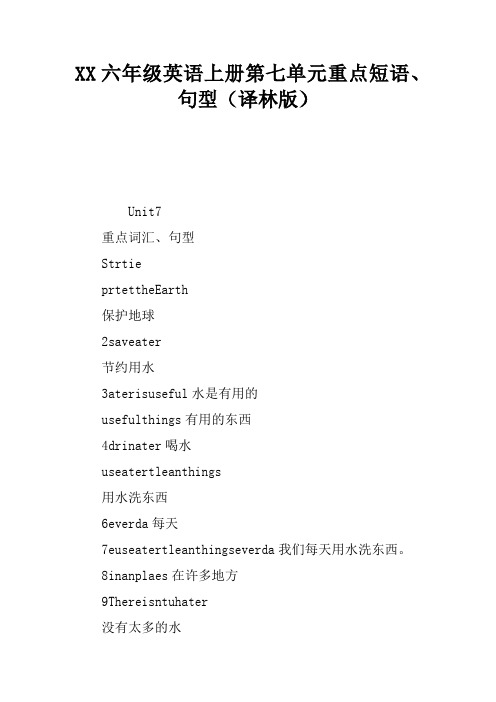
XX六年级英语上册第七单元重点短语、句型(译林版)Unit7重点词汇、句型StrtieprtettheEarth保护地球2saveater节约用水3aterisuseful水是有用的usefulthings有用的东西4drinater喝水useatertleanthings用水洗东西6everda每天7euseatertleanthingseverda我们每天用水洗东西。
8inanplaes在许多地方9Thereisntuhater没有太多的水uhater太多的水Thereisntuhaterinanplaes在许多地方水资源缺乏。
0eshuldntasteater我们不应该浪费水。
1asteater浪费水2eshuldreuseandsaveater我们应该再利用和节约水资源3saveenerg节约能源4stfurenerg我们大部分的能源efralandil来自煤炭和石油6ThereisntuhalrilnEarth地球上没有太多的煤炭和石油nEarth在地球上7eshuldsaveenerg我们应该节约能源。
8eshuldntdrivesuh我们不应该多开车。
drivesuh多开车19usealtfenerg使用许多能源20savetrees节约用树21eshuldsavetrees我们应该节约用树。
22desfrtrees木头来自于树木efr=befr来自23eusedtaetables,hairsandantherthings 我们用木头制作桌子,椅子和许多其它东西。
24antherthings许多其它的东西。
2eshuldntutdntantrees我们不应该砍伐太多的树。
26utdntantrees砍掉太多的树27Treeshelpeeptheairlean树帮助净化空气28Dn’tusetuhplasti不要使用太多的塑料29euseplastitaebagsandbttles我们用塑料制作包和瓶子。
六年级上册英语重点句型语法总结
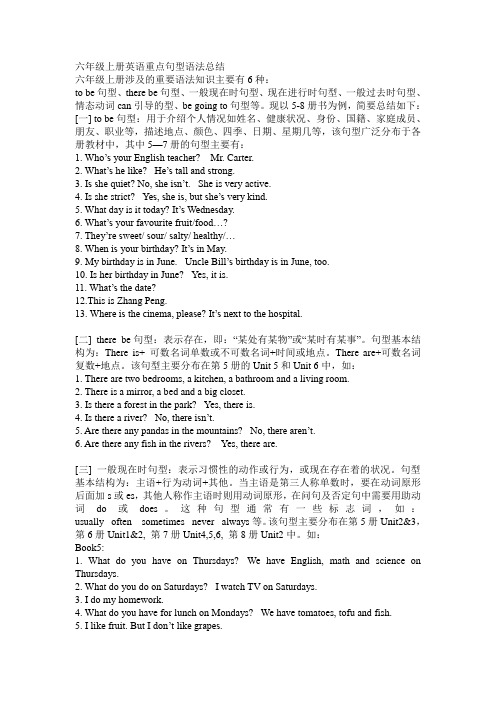
六年级上册英语重点句型语法总结六年级上册涉及的重要语法知识主要有6种:to be句型、there be句型、一般现在时句型、现在进行时句型、一般过去时句型、情态动词can引导的型、be going to句型等。
现以5-8册书为例,简要总结如下:[一] to be句型:用于介绍个人情况如姓名、健康状况、身份、国籍、家庭成员、朋友、职业等,描述地点、颜色、四季、日期、星期几等,该句型广泛分布于各册教材中,其中5—7册的句型主要有:1. Who’s your English teacher?Mr. Carter.2. What’s he like?He’s tall and strong.3. Is she quiet? No, she isn’t.She is very active.4. Is she strict? Yes, she is, but she’s very kind.5. What day is it today? It’s Wednesday.6. What’s your favourite fruit/food…?7. They’re sweet/ sour/ salty/ healthy/…8. When is your birthday? It’s in May.9. My birthday is in June. Uncle Bill’s birthday is in June, too.10. Is her birthday in June? Yes, it is.11. What’s the date?12.This is Zhang Peng.13. Where is the cinema, please? It’s next to the hospital.[二] there be句型:表示存在,即:“某处有某物”或“某时有某事”。
句型基本结构为:There is+ 可数名词单数或不可数名词+时间或地点。
开心学英语六年级上册Unit7He’sbetterthanus-
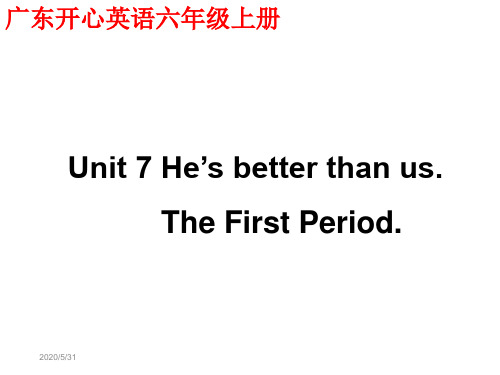
如: right, wrong, woolen等。 形容词的比较等 级的用法:比较级用于二者的比较。 【例】 Li Ping is older than Wang Hai. 李平比王海年纪大。 There are more students in Class One than in Class Two.一班比二班学生多。
2020/5/31
5)其它双音节和多音节词皆在前面加单词more 和most。 【例】 careful more careful most careful difficult more difficult most difficult delicious more delicious most delicious
2020/5/31
The leopard is faster than the rabbit.
2020/5/31
Hummingbird is very small.
2020/5/31
The bee is smaller than the hummingbird.
2020/5/31
The turtle is so slow.
2020/5/31
Than sloth is slower than the turtle.
2020/5/31
英语形容词比较级
(一)一般句式的构成: A + is / are+ 形容词比较级+ than + B A 是主格 B 是宾格 如: She is taller than me. 主格 形容词比较级 宾格
六年级上册第七单元知识点

六年级上册第七单元知识点
六年级上册第七单元的知识点主要包括以下部分:
1. 形容词和副词的最高级形式。
形容词和副词的最高级用于描述三者或三者以上的人或事物中的最高或最后一名。
形容词最高级的构成是在形容词后加“est”,副词最高级的构成是在副词后加“most”。
例如,形容词“happy”的最高级是“happiest”,副词“quickly”的最高级是“quickest”。
2. 表示顺序的词汇。
例如,first、second、third等,这些词用于描述事物发生的顺序或排列的顺序。
3. 表示比较级的词汇。
例如,than、less、more等,这些词用于描述两个事物之间的差异。
4. 表示最高级的词汇。
例如,the most、the least等,这些词用于描述三个或三个以上事物中的最高或最低。
5. 句型结构。
例如,“I am the tallest in my class”表示“我是我们班里最高的”。
6. 常用的形容词和副词的比较级和最高级形式。
例如,good的比较级是better,最高级是best;well的比较级是better,最高级是best。
7. 注意事项。
在比较级和最高级的表达中,需要注意单数名词的所有格和复数名词的所有格形式。
例如,“John’s height”表示“约翰的高度”,“the students’ marks”表示“学生们的学习成绩”。
以上是六年级上册第七单元的主要知识点,通过掌握这些知识点,学生可以更好地理解课文内容,提高语言表达能力。
(广东版)开心英语六年级上册 Unit 7 重要句型

Unit7重要句型1._____________________________ 祝你新年快乐!2. ________________________________ 你午夜时候在哪里?3. When the bells ______ , I was _____ _______. I _____ ______ TV ___ my family.当新年钟声响起时,你在家和家人看电视。
4. _____ _______ you ______ ________ China _____ the 2008 Olympics?当中国获得奥运主办权时你在做什么?5. I ____ _____ homework ______ I_______ the news _______ TV.当我看到电视新闻时,我在做作业。
6.I ______ _______at the swimming pool _____ I ________ ________ it.当我听到新闻时我在游泳池。
7._________________________ 当我遇到你时你在做什么?8.______________________________ 我们在攀爬和滑滑梯。
9. I _____ _______ at school ______ you _____ in.当你进来的时候,我在学校学习。
10. Jill ____ ______ her homework ____ she _____ something.当她听到一些声音的时候,Jill正在做作业。
11. I _____ ______ the plants _____ you ______ your present.当你收到你的礼物的时候,我正在给植物浇水。
12. I _____ ______ TV _____ you _____ your present.当你收到你的礼物的时候,我正在看电视。
(广东版)开心英语六年级上册 Unit 1 重要句型

Unit 1重要句型1.我应该怎样去见陌生人呢?__________________________________________2.我应该和他们交谈吗? 是的,你应该.___________________________________3.我应该拥抱陌生人吗? 不,你不能.__________________________________________4.当你等候公车的时候,你必须排队。
_________________________________________5.当你等候公车的时候,你不应该推人或跑。
____________________________________________________________________6.当我遇见新朋友的时候我要做什么呢?______________________________________7.当你遇见年老的人的时候,你要和他们握手和说话.____________________________________________________________________8.当你见年轻人的时候,你可以一边挥手一边说”你好”.____________________________________________________________________9.当我们第一次见新朋友的时候我们通常不拥抱他们.____________________________________________________________________10.当家人不在家的时候,我应该怎样接电话呢?____________________________________________________________________11.我能为你记下留言吗? ________________________________________________12.我的火车明天早上10点到达.____________________________________________13.当你犯了一个错误的时候,你应该说“对不起”.____________________________________________________________________--1--。
- 1、下载文档前请自行甄别文档内容的完整性,平台不提供额外的编辑、内容补充、找答案等附加服务。
- 2、"仅部分预览"的文档,不可在线预览部分如存在完整性等问题,可反馈申请退款(可完整预览的文档不适用该条件!)。
- 3、如文档侵犯您的权益,请联系客服反馈,我们会尽快为您处理(人工客服工作时间:9:00-18:30)。
广东版开心英语
六年级
英语学习基础很重要,记住单词,默写单词,不要粗心大意。
广东版小学开心英语和你一起共同进步学业有成!
Unit7重要句型
1._____________________________ 祝你新年快乐!
2. ________________________________ 你午夜时候在哪里?
3. When the bells ______ , I was _____ _______. I _____ ______ TV ___ my family.
当新年钟声响起时,你在家和家人看电视。
4. _____ _______ you ______ ________ China _____ the 2008 Olympics?
当中国获得奥运主办权时你在做什么?
5. I ____ _____ homework ______ I_______ the news _______ TV.
当我看到电视新闻时,我在做作业。
6.I ______ _______at the swimming pool _____ I ________ ________ it.
当我听到新闻时我在游泳池。
7._________________________ 当我遇到你时你在做什么?
8.______________________________ 我们在攀爬和滑滑梯。
9. I _____ _______ at school ______ you _____ in.当你进来的时候,我在学校学习。
10. Jill ____ ______ her homework ____ she _____ something.
当她听到一些声音的时候,Jill正在做作业。
11. I _____ ______ the plants _____ you ______ your present.
当你收到你的礼物的时候,我正在给植物浇水。
12. I _____ ______ TV _____ you _____ your present.
当你收到你的礼物的时候,我正在看电视。
相信自己,就能走向成功的第一步
教师不光要传授知识,还要告诉学生学会生活。
数学思维可以让
他们更理性地看待人生。
